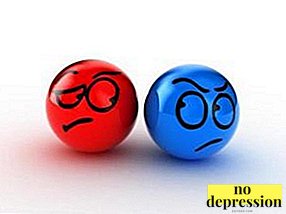Resentment - a feeling familiar to everyone. Sometimes it passes when the abuser admitted the mistake and apologized. But sometimes we live with her for many years, not wanting to forgive and let go of the past. But what is this feeling? Why does it arise and is it necessary to fight it? How to cross the pain, to get rid of the resentment and harm that it brings? We'll figure out.
What is insult?
An insult is an emotion that occurs after aggression or grief. Offended people have been concentrating on negative feelings for a long time, carrying thoughts of revenge. Unlike such emotions as aggression, discontent or outrage, which manifest themselves openly, the opposite can be said about offense. Its feature is a secretive character. Due to frequent understatement, it destroys a person from the inside, making him more susceptible.
Any ill-advised word, insulting nicknames, an unsuccessful joke in our direction or a situation that we consider to be dishonest towards us - all this causes frustration. Exactly what touches, and the most painful still does not allow to remain indifferent for a long time.
Most of all, we tend to be offended when we understand that the abuser is right. So, resentment is a subjective concept and depends on a personal decision: to be offended or not. There is an opinion that for a long time they carry in themselves an insult to vindictive people who are waiting for the moment for revenge. But there are those who easily let go unpleasant. It depends on personality traits and how vulnerable a person is.
Nevertheless, everyone can be offended, it all depends on the individual "pain" topics. When one of them touches, we dramatically change our attitude towards others, angry and hating everything that surrounds us. But how rarely do we think that we can become the cause of such behavior.
How offended
Touchiness is what we gain, and not with what we are born. If aggression and fear act as defensive reactions of the psyche, then resentment is rather manipulative. Being offended by someone, we understand that we make others feel guilty and should be ours. And this scheme really works, otherwise insults would not exist. It appears in childhood, when parents try to please the whims of the child.
Growing up, we understand that not all dreams come true, there is no one to act in our place. The more parents took care of and fulfilled our whims in childhood, the greater the likelihood that expectations will not correspond to reality.
It is because of unjustified hopes that a feeling of injustice towards us arises. When the internal forces and the mind are not able to think soberly, the psyche gives a signal of helplessness, that is, it says that it is not in our power to leap to the situation. It is helplessness and injustice that provokes a feeling of resentment.
Diseases Caused by Resentment
To finally make sure that you need to get rid of such a feeling and stop, let us tell you what offense is harmful. Psychology says that any negative emotion, experience affects mental health. Different parts of the brain take part in these or those emotions. With constant negative feelings, certain psychological blocks arise that further affect health. For example, often suppressing an insult, we experience discomfort and pain in the chest. No wonder there is an opinion about sore throat as a sign of understatement. Perhaps this is the same unspoken discontent?
And such a disease as "diabetes" is considered a "disease due to stress." What to say about the problems with the stomach, if this organ is the most susceptible to stress.
The most frequent cases of insult
Insult is multifaceted, and most importantly - unpredictable. How many people have views on the situation, so many chances to hurt someone or to quarrel because of a discrepancy of opinions. If at least in one case you manage to know yourself, then it's time to think. But most often the insult is due to:
- Ingratitude. When we help someone, we expect at least a modest "thank you" in response, although we do not always receive it.
- Betrayal. Hoping for someone or trusting, we expect the same return. The indifference or frivolity of people close to us hurts.
- Bad luck or bad luck. Anger laments the one who constantly fails. The main rule is not to look for the culprit, but to eliminate the cause.
- Loneliness. Man is a social being, it is extremely unpleasant for him to be expelled from society. Being often alone with ourselves, we begin to resent others and blame them for that.
- Envy. No matter how strange it may seem at first glance, but the initial stage of envy is an insult that someone possesses something that we do not have.
- Personal misses rooted in the head succession of failures, destroying morale.
- Missed time. Chagrin is not directed at a specific person, but inside. A person feels an uncertain sadness and longing for the past time. Often this happens when we think about what we have achieved in life or compare ourselves with others.
Psychology of resentment: reason → decision
Resentment - accumulated emotion that occurs for some reason. We define them and find a way to resolve.
Childhood injuries
Cause: (offense to parents, offensive nicknames at school, broken dreams). Many people do not know how strongly children’s offense affects their parents on adult life. Most of the complexes and psychological clips are the insecurity that has been instilled in us since childhood.
Decision: Realize what the situation has become negatively significant. Many stories remain unresolved due to the fact that parents are not aware of their guilt. The best solution is a heart-to-heart talk. Sincerely telling parents what moments from childhood provoke an insult, you can free yourself from the burden of burden once and for all.
Personal failure
Cause: Sometimes we are so disappointed in failures that we shift the blame on others. So envy appears.
Decision: Learn to analyze your mistakes and draw conclusions. Failure is a signal that something is being done incorrectly. Accurate goal setting, compliance with it and self-confidence will help to achieve success.
Inability to express emotions
Cause: Offense - an emotion that accumulates over the years. For this reason, it is very important to be able to get rid of it.
Decision: More often talk about your experiences, express discontent and disagreement. The most offensive phrases are those that we allow ourselves to hurt. You need to drive away the negative of others and love yourself.
Get rid of resentment: 4 decisive steps
Awareness
The first step towards solving any problem is the awareness of its presence. Many people live with resentment for years because they do not want or are afraid to admit to themselves that it is present.
Wording
After awareness, you should find out what exactly became the root of the problem. The correct formulation will help in future to get rid of this feeling.
A responsibility
It is important to understand that only we are responsible for this feeling, which means that it is up to us to decide whether to get rid of it or not. And if you get rid of, then in what ways.
Search for a cause
The search is often already the solution itself. When we work through a situation again and again in our heads, we often understand that the insult is unreasonable. If the decision does not come immediately - an attempt to unwind everything in the reverse order will help. Often the phrase "I was offended" is a method to attract attention.
To eradicate the offense, there are some more helpful tips:
- Learn to listen and empathize with others.
- Look at the situation from different angles.
- Work on complexes and uncertainty.
- Express negative, not accumulating it in itself.
- Do not be afraid to ask for help.
- Analyze your failures.
Offense - the worm of the subconscious, with which you need to fight. A free person is, first of all, a person free from resentment. Therefore, we are looking for a reason, a solution, and no longer load our heads with depressing feelings.



